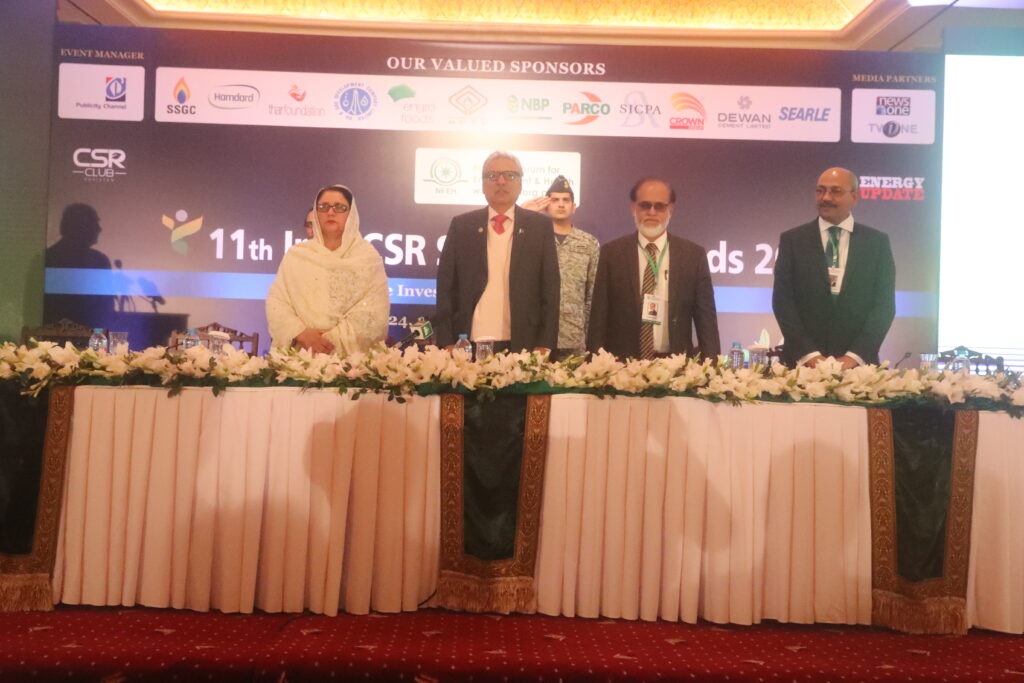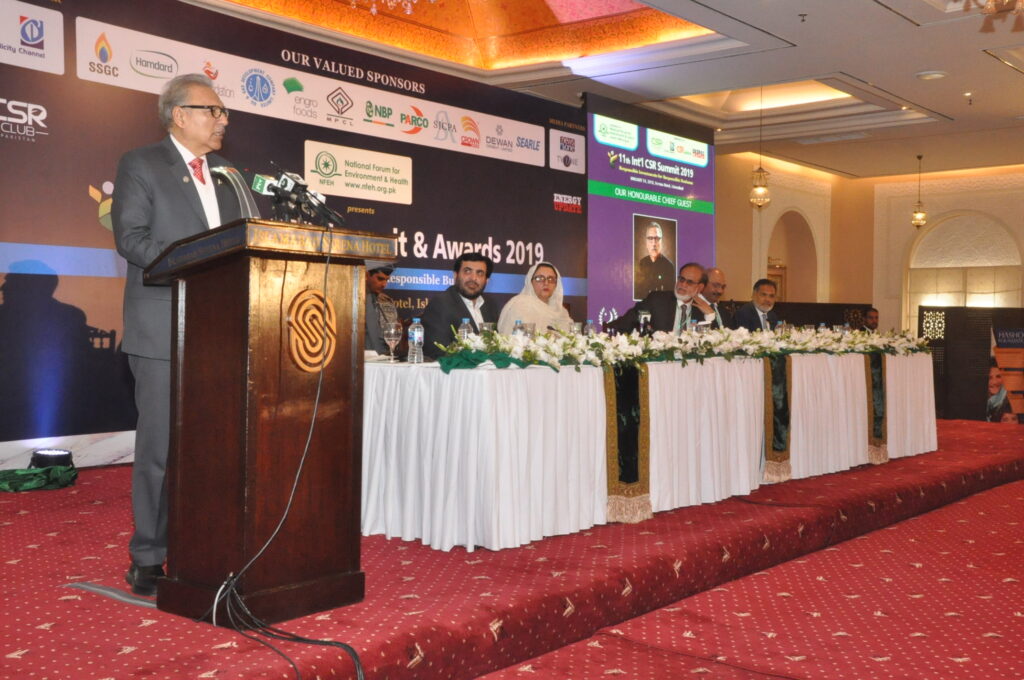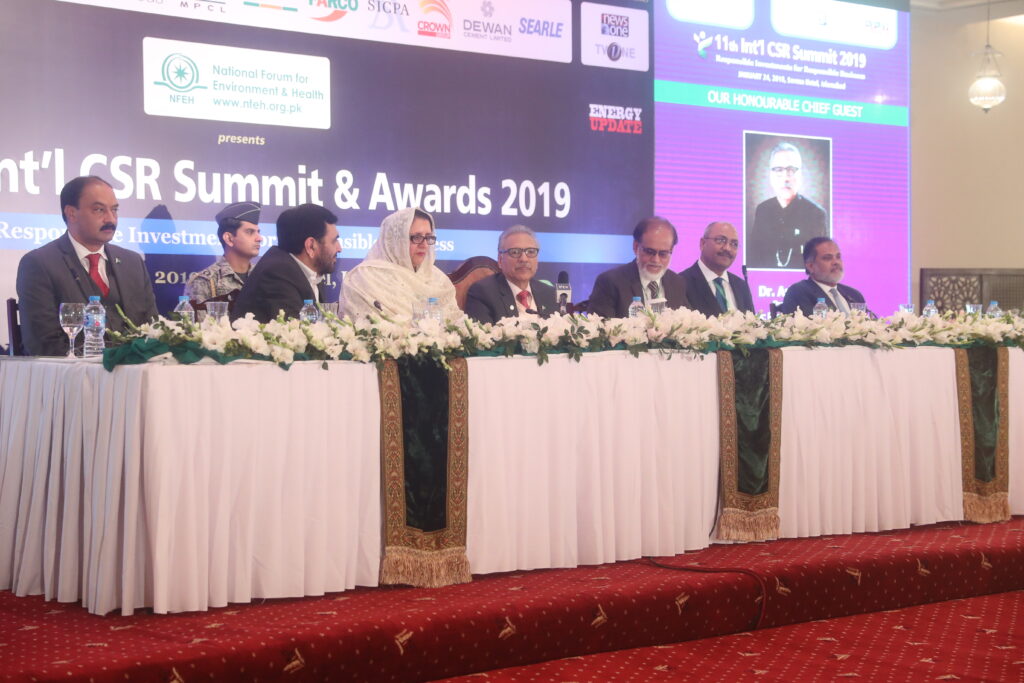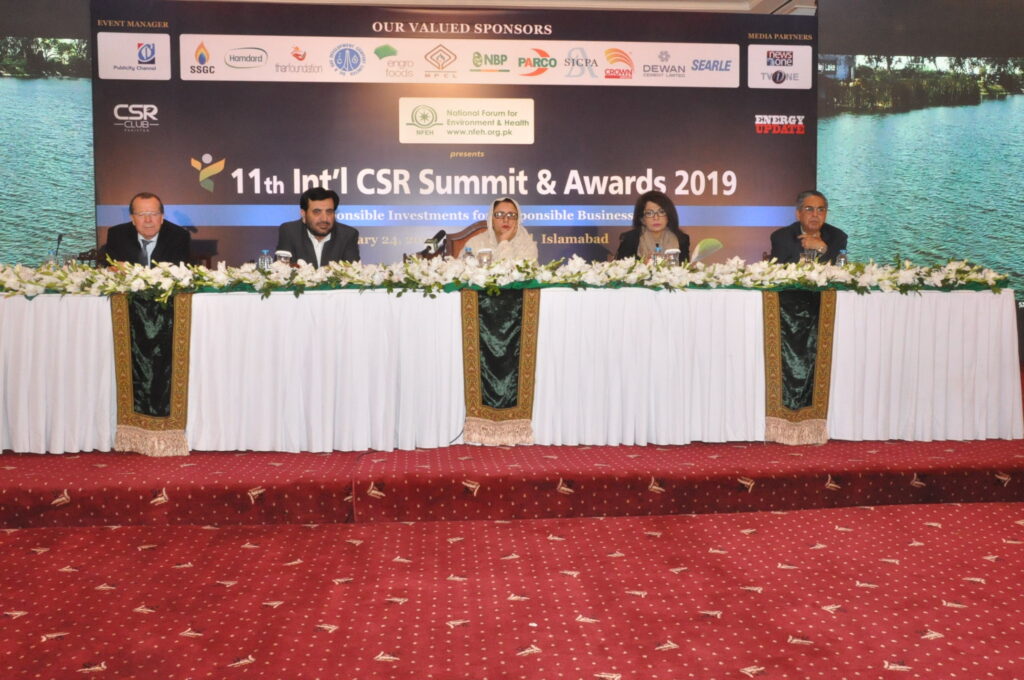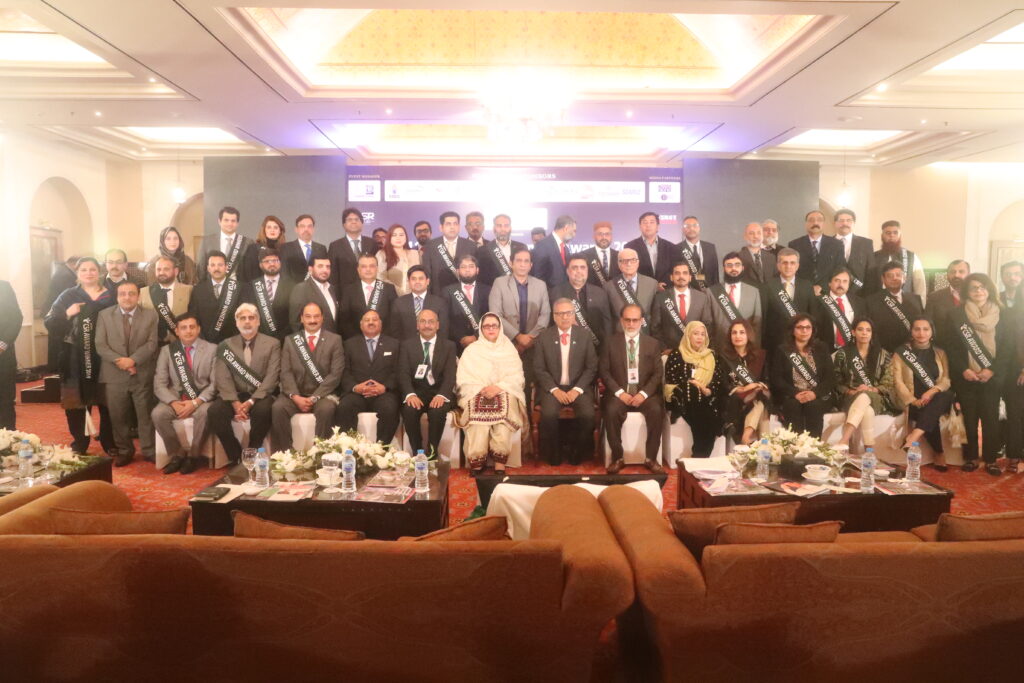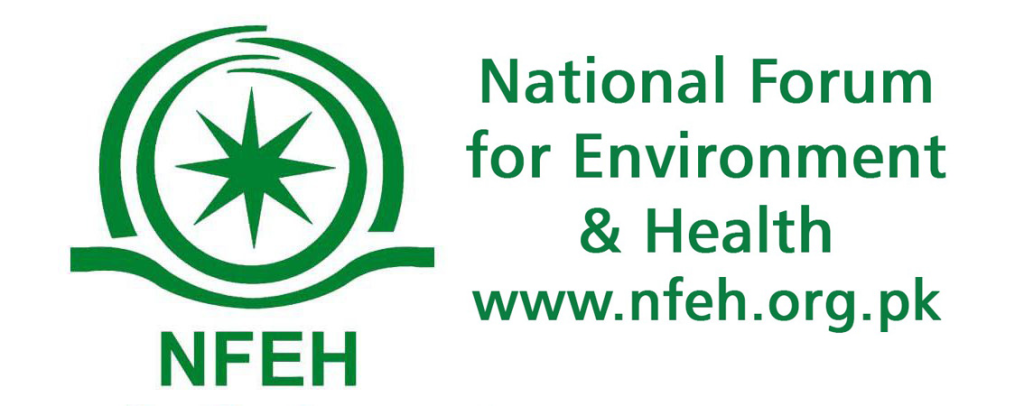President Dr Alvi urges businesses to do philanthropy in line with basic teachings of Islam for compulsory charity
Islamabad, January 24: President of Pakistan Dr Arif Alvi has said that the businesses in Pakistan should do philanthropy while being driven by one of the fundamental principles of Islam making it binding upon the rich people to do charitable spending for well-being of the have-nots in the society to extricate them from the exploitative cycle of poverty.
The President stated this on Thursday while speaking as the chief guest at the inaugural ceremony of the 11th International CSR (Corporate Social Responsibility) Summit and Awards-2019 organized by the National Forum for Environment and Health (NFEH).
“Our religion makes it binding upon the rich people to do the CSR work as the concept of Islam could not be completed without ensuring social service and social justice for the destitute people,” said the President in his address at the ceremony.
“It is being reported that the wealth accumulated by 26 richest people in the world are more than the financial resources of 3.5 billion people as the capital of these affluent persons could be enough to end poverty, diseases, and hunger from around the globe. This could not go forward like this on never-ending basis that so much enormous wealth remains accumulated in the hands of a very few people at the cost of poverty-stricken population.,” he said.
The President said that Pakistanis had firm belief in doing extensive charitable work to support the people in distress in their native areas as this phenomenon could be gauged by the lone fact that Pakistan had wholeheartedly accepted 3.5 million refugees from Afghanistan facing civil war-like situation in their homeland.
“Pakistanis never raised the demand to forcibly repatriate these Afghan refugees to their native country and till to date a large number of these refugees continue to live in Pakistan. This is in sheer contrast to the practice of European countries, which despite being the torch-bearers of human rights in the world do extensive negotiations to accept a few hundreds of migrants escaping deaths and destruction in their native lands,” said Dr Alvi.
He said that there was a need to adopt legislation and regulations binding upon the corporate sector of Pakistan to reserve minimum one per cent of their annual profits for doing projects of health, education, and for other urgent social needs of the downtrodden masses. “The corporate entities, which don’t do such a mandatory charitable work for the poor people around them is in fact doing the biggest social disservice,” he said.
The President said that a state should ideally adopt a taxation regime enabling it to tax the affluent sections of the society while generating sufficient financial resources to do spending for the well-being and social uplift of backward sections of the society.
He said that it was mandatory social obligation of rich people to spend their wealth for the benefit of the have-nots as in this manner Pakistan would soon be a prosperous country after overcoming the menace of poverty.
Also speaking on the occasion, Federal Minister for Defence Production Zubaida Jalal said that the Securities and Exchange Commission of Pakistan should review its CSR-related guidelines for the Pakistani corporate sector to align them with the Sustainable Development Goals-2030 of the United Nations.
The federal minister said the government, corporate sector, and civil society in Pakistan should align their vision and efforts to do mandatory social work in the society especially to achieve the goal of promoting education among the backward and destitute sections of the population.
She said that business initiatives being launched in the country under the umbrella of China Pakistan Economic Corridor project should lead to socially responsible investments for the good of the local communities.
She said that standardization should be done in the country to define standards of socially responsible investments by the corporate sector and also to bring transparency in their working and spending.
She said that Pakistan could easily transform into a country doing sustainable development if the government, corporate sector, and civil society combined their efforts and resources for benefit of the society.
The Ambassador of Germany in Pakistan Martin Kobler said that it would be unfeasible to ask German companies to invest in the industrial estates of Pakistan where the industries mostly didn’t take care about the damage being done by them to the environment through their harmful effluents.
He said that corporate and industrial sector in Pakistan should take care of the environment in their surroundings and should also observe stringent safety standards for labourers working in the factories as their prime social responsibility.
He said that every company should switch to consuming bio-degradable plastic for packing and other purposes in order to safeguard the environment.
The German diplomat said that Germany had switched to power production through renewable means of energy after abandoning the option of nuclear-based electricity production as in this manner it had contributed a lot to control its harmful emissions. “But switching to renewables has led to massive investment and generation of job opportunities in Germany so a country should not link cutting on Carbon Dioxide emissions with its economic growth as this is also the most feasible way to be adopted by Pakistan,” said Mr. Kobler.
Chairman of Sindh Engro Coal Mining Company Khurshid Anwer Jamali said that first electron of electricity based on Thar coal would be produced in the third week of February, 2019 as this would also lead to massive social transformation of people living in Islamkot area where mining project is being undertaken to extract coal for electricity production.
He said that coal-based power generation plants were being installed in Thar area, which meets the national and international environmental standards including that of the World Bank and IFC.
Ali Tauqeer Sheikh, CEO of LEAD Pakistan, said that every business and industrial entity should become socially and environmentally responsible in its every practice, which had become the business model becoming popular in the developed part of the world.
He said that efforts to do poverty alleviation in a society like Pakistan should also tackle challenges to the climate as poverty could not be overcome without combating the climate problem.
NFEH President Naeem Qureshi said that CSR Summit and Awards were being regularly done on an annual basis to encourage and appreciate excellent social work by the Pakistani corporate sector while setting an example to be followed by the other concerned sections of the society.
He urged the President of Pakistan to institute a civil award in the country to be conferred on a regular basis upon the NGOs or corporate sector involved in exemplary social work in Pakistan.
